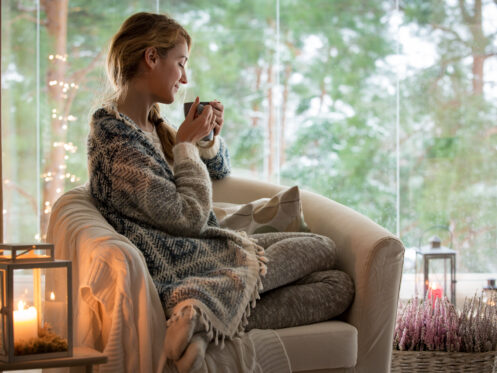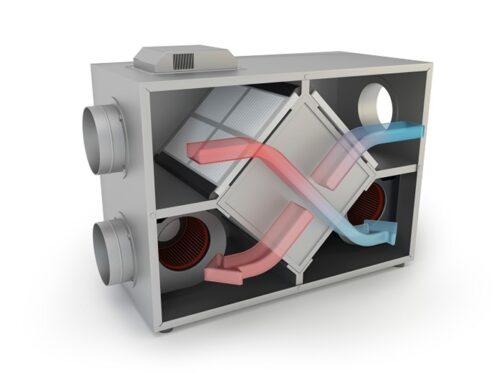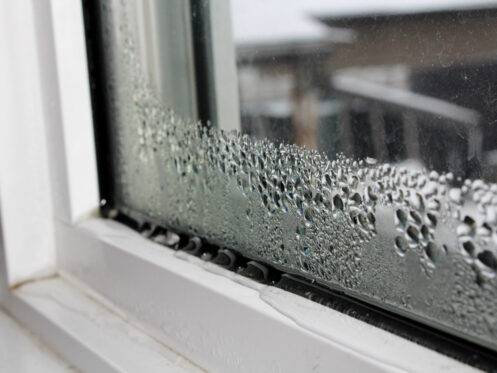Local weather patterns and environmental variables can worsen winter allergies in Jacksonville Beach, FL. Mold and allergens flourish in the region’s usual high humidity. Plus, the area has a lot of pollen-producing plants, including oak and pine trees. Keeping an eye on indoor air quality levels is crucial for those who live here and suffer from allergies, asthma, or a respiratory illness. If a home has poor indoor air quality, it will make coughing, watery eyes, sneezing, and other allergy symptoms much worse. Fortunately, there are several tips Jacksonville Beach homeowners can use to improve indoor air quality in the winter.
1. Install Specialized Air Filters
High-efficiency particulate air (HEPA) filters are great for those who suffer from allergies. Dust mites, pollen, pet dander, and mold spores are just some of the allergens that these filters capture. HEPA filters improve indoor air quality by efficiently capturing particles as tiny as 0.3 microns. Activated carbon in allergen-specific filters absorbs smells and volatile organic compounds, giving allergy sufferers even more protection. To keep the air clean and free of allergies, you must change these filters according to the manufacturer’s instructions or any time you notice they are dirty. This is usually once every 30 to 90 days.
2. Air Leak Sealing
Air leaks are popular entry spots for pollen and mold spores. As these elements build up in the home, allergy symptoms become worse. Getting rid of these leaks is paramount to improving indoor air quality. There are lots of methods for getting rid of air leaks, such as caulk, spray foam, foam gaskets, HVAC tape, and sealant. During the sealing process, it’s best to focus on sealing leaks around windows, doors, and gaps in walls. To keep outside allergens out of your house, have a professional seal up the cracks and crevices in the basement, attic, and crawl space as well.
3. Maintain Healthy Humidity
Keeping indoor relative humidity at a comfortable level can help Jacksonville Beach homeowners reduce their risk of winter allergies. To increase relative humidity, set your humidifier to 30% to 50%. To prevent mold from growing in the humidifier, clean and change the filter regularly. When necessary, increase ventilation to lower humidity levels in your house, particularly in places where it tends to accumulate. Make sure there is enough ventilation in the kitchen and bathrooms, and fix any water leaks right away. The best way to increase ventilation in the kitchen and bathrooms is to use exhaust fans.
4. Redecorate to Avoid Clutter
Clutter makes it difficult to keep a living space clean and allergen-free. Reorganizing is an easy way to get rid of clutter and keep winter allergies at bay. To reduce dust and allergens, go for minimalist furniture that has easy-to-clean surfaces. Avoid thick textiles that collect allergens, and opt for washable curtains instead. Make use of storage options to keep things neat and tidy, and dust and clean surfaces on a regular basis. When you keep your Jacksonville Beach house free of clutter, cleaning and maintaining it become much simpler. This leads to improved indoor air quality and lowers the risk of winter allergies caused by dust mites and other allergens.
5. Sleep On Allergy-Friendly Bedding
Choosing bedding that protects against allergen exposure is essential for those who suffer from winter allergies. Choose mattress protectors and pillows made of hypoallergenic materials to avoid dust mite exposure. Wash your bedding in hot water at least once per week. Invest in pillows made of synthetic, hypoallergenic materials or down alternatives.
6. Clean Up and Vacuum Every Day
If you want to get rid of allergies for good, you have to vacuum and clean up every day. When you clean with wet wipes or cloths, dust is less likely to become airborne because the moisture traps all of the particulates. Pollen, which is very small, is easy to capture with this technique. It also reduces the likelihood that these allergens may re-enter the air or land on other surfaces.
Vacuuming will remove allergens from the fibers of your carpets in order to eliminate your exposure. Just make sure you regularly empty your vacuum canister or replace the bag in order to prevent particulates from circulating back into your indoor air.
7. Be Careful With Indoor Plants
Be careful around houseplants if you suffer from winter allergies. Stay away from ferns, which are plants that attract mold. For a greener environment, use hypoallergenic plants like peace lilies, aloe vera, or snake plants. By adding properly placed hypoallergenic plants to your home’s décor, you can enhance its visual appeal while simultaneously reducing the chance of mold-related allergies.
8. Groom Your Pets Regularly
Another key way to deal with seasonal allergies is to groom your pets regularly. This should be done approximately once a week. Brushing reduces the amount of hair and dander floating about your house. It also helps if you wipe your pet off with a moist towel once a day and wash them once every seven to 10 days using hypoallergenic shampoos. Make sure to reduce your pet’s ability to transfer allergens by keeping them off of beds and upholstered furniture.
9. Close the Windows on High-Pollen Days
Jacksonville Beach tends to experience some pretty comfortable weather, even in the winter. Because of this, it can be tempting to keep your windows open for most of the year. In the winter, this can aggravate winter allergies. To avoid this problem, you’ll need to monitor outdoor pollen levels. On days when it’s high, shut the windows. If you don’t, pollen can easily make its way inside and result in an allergic reaction.
10. Consider Removing Carpet
A great way to reduce the severity of winter allergies is to get rid of carpeting. Allergens like dust mites and dust settle into carpet fibers, making breathing difficulties worse. Hardwood, laminate, or tile floors are less likely to trap allergens. They’re also simpler to clean. By replacing carpets, you instantly create a healthier environment for you and your family to live in throughout the winter months.
11. Consider an Air Exchanger
Consider the installation of an air exchanger to make your home healthier and less polluted. An air exchanger maintains a continuous flow of air by drawing in outside air and releasing stale air within. As a result, there are fewer indoor allergens, which improves indoor air quality. This is particularly important in the winter, when people often close up their homes to keep the cold out.
12. Schedule Maintenance for Heating and Cooling Systems
To keep your allergies to a minimum in the winter, get your heating and cooling systems serviced regularly. By keeping your HVAC system in good working order, you can reduce the amount of allergens in the air through effective circulation and filtration.
Buehler Air Conditioning & Plumbing offers a variety of services to improve indoor air quality. We help homeowners with duct replacement, HVAC zoning, air purifiers, UV lights, and more. We also provide HVAC maintenance, heat pump installations, and duct sealing. Contact us now to learn more about improving indoor air quality in Jacksonville Beach.




